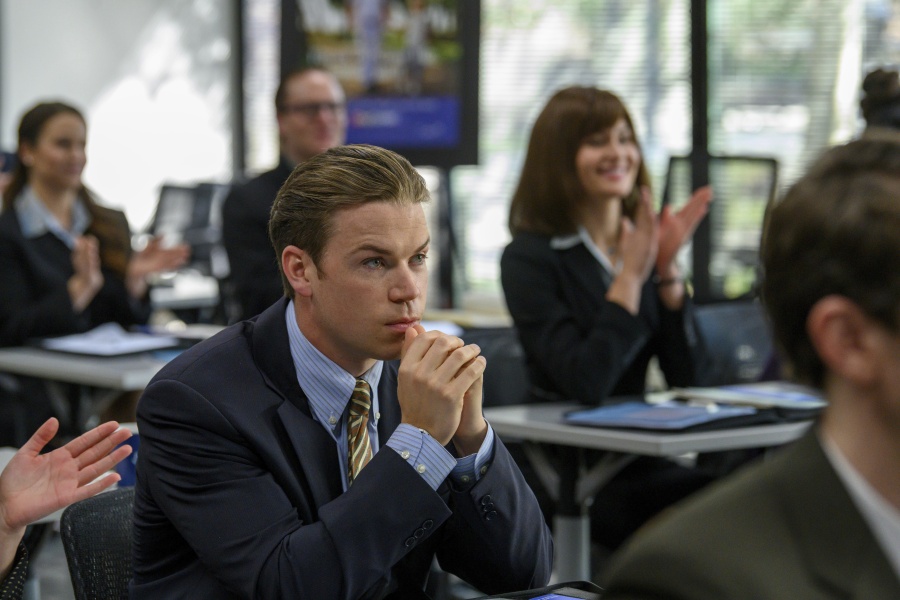At times, “Dopesick” is a quiet, heartbreaking story about a West Virginia coal town and the locals trying to survive.
And at times, it’s a police procedural about federal prosecutors and a Drug Enforcement Administration agent trying to force the justice system to notice the thousands of people getting addicted to OxyContin.
“Dopesick” is also a tale of an obscenely rich family and how they make — and keep — their money.
“This show documents one of the biggest crimes in the history of this country and (how) the people who committed these crimes … are mostly getting away with it,” creator Danny Strong told the Daily News.
“This show in many ways is the trial of Purdue Pharma, which is micromanaged by the Sackler family, the trial that never happened,” he added.
From the mid-1980s, the Sackler family ran Purdue Pharma, started three decades earlier as a small pharmaceutical company, as one of the largest sellers in the world, buoyed by the 1996 introduction of OxyContin. They remain one of the wealthiest families in the United States today.
The eight-episode limited series, based on Beth Macy’s 2018 book “Dopesick: Dealers, Doctors and the Drug Company That Addicted America” which premiered Wednesday on Hulu, weaves between multiple storylines and timelines in an ambitious attempt to cover decades of the opioid crisis, from the Sackler family, who funded it, to the patients suffering the consequences.
The pills flow down, from Richard Sackler (Michael Stuhlbarg) to the pharmaceutical reps (Will Poulter and Phillipa Soo) to the doctors (Michael Keaton) to the pain patients (Kaitlyn Dever). The lie flows in that same direction: “OxyContin is nonaddictive.”
It wasn’t nonaddictive. It’s unclear if and when the Sacklers knew that. Tens of thousands of patients found out too late.
By showing their wrongdoing, Strong, 47, said, “we can show how the opioid crisis started, flourished, continues.”
“You often hear the statistic about people who died in the opioid crisis, but there’s five times as many people that lost years of their lives to addiction and the pain and struggle and torment for their family members to go through that,” he said.
He added that he wanted the country to understand how the Sacklers “lit the flames for the opioid fire and then threw gasoline on those flames for 20 years.”
The big bad of “Dopesick” is clear: Richard Sackler, with his complete disregard for humanity when there is money to be made. The question is how far should the blame go. Sackler’s scientists who found data to prove their point? The FDA, which fell for the too-good-to-be-believed line about the nonaddictive properties of OxyContin? The salespeople who took the apparent lies from the scientists and relayed them directly to the small-town doctors and bragged about their white whales? The doctors who would dole out the pills like candy? The doctors who prescribed the OxyContin? The patients who got addicted?
In an opioid crisis still going in its third decade, there’s enough guilt for everyone.
“The intention from Danny was to show how young people stepping into the role of the salesperson with this company could easily have gotten wrapped up in the culture of fraud and bribery and deceit that was part of the training process,” Poulter, the 28-year-old English actor, told The News.
“A lot of people were enticed by the trappings of money and status and a pretty great lifestyle. The Purdue reps lived incredibly well and were paid an exceptional amount of money, particularly when you contrast that with the amount of money the typical OxyContin taker would have been making in the mines.”
On Sept. 1, a federal bankruptcy judge gave conditional approval to a settlement that will remove the Sackler family from ownership of OxyContin maker Purdue Pharma and devote potentially $10 billion to fighting the opioid crisis that has killed a half-million Americans over the past two decades. It also requires members of the Sackler family, who are scattered across the U.S., Britain and elsewhere in Europe, to get out of the opioid business worldwide. Afterward, members of the Sackler family said: “While we dispute the allegations that have been made about our family, we have embraced this path in order to help combat a serious and complex public health crisis.”
The one person “Dopesick” is insistent on not blaming is the patient.
“Ultimately, the issue at hand with this story is that growth is infinite, capital as a theory can be infinite, but people’s lives are not,” Soo, 31, told The News.
“We’re seeing us reaching the brink before it spills over, and then, when it does, why are we asking ourselves how did we get here, when we know exactly how we got here?”



